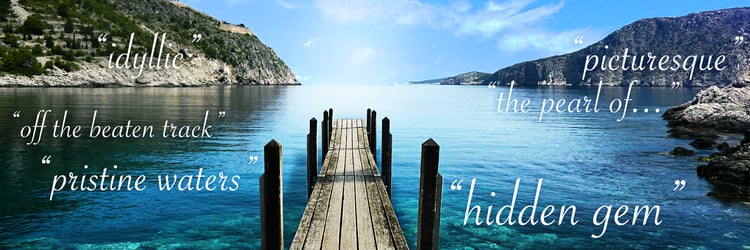
We’ve recently been covering how, as hotels, you can get your guests to do your marketing for you, but if your website (or ‘shop window’) is not up to scratch, all the marketing advice in the world won’t convert your visitors into bookings. Because this topic is just so extensive, we’ll tackle it in bite-size chunks, starting with the foundation of any good website: the copy.
As your prospective guests browse hotel websites, online travel agents and social media sites, they are bombarded with a slew of information about hotels, destinations, activities and restaurants. However, as varied and interesting as the world is (that’s why we travel, after all) so much of the content on hotel websites is uninformative, uninspiring, and unimaginative, and it leaves the travel-planner no more informed or inspired than he was when he started searching.
Thinking about your guest’s path to purchase – what is the point of your website? Are you looking to inspire a traveller with not only your hotel but your location? Do you want to draw them in and engage them, or do you simply want to ‘wow’ and make booking as simple as possible? It could be one, or all three, but if the words you use don’t back it up, travellers will be left directionless.
Once you have decided what you would like your website to achieve, keep in mind these basic best practices to make sure that your copy doesn’t get lost in the quagmire of commonality that is modern travel writing.
1. Avoid clichés
Every second guesthouse you read about is “nestled” somewhere, hotels are always in “vibrant” cities, and the scenery around lodges is “breathtaking” so often it’s a wonder no one has suffocated.
Writing that has anything to do with hotels and travel seems to be especially vulnerable to over-used and subsequently empty words. These travel writing clichés, while not inherently objectionable, have been overused to the point where they mean nothing other than that your copywriter is lazy. A few other offenders include:
- World-class
- Something for everyone
- Unspoilt
- Must-see
- Luxurious
- Rich heritage
Don’t be lazy
Often it is laziness that leads to the use of clichés – you use the first word or phrase that comes to mind because you couldn’t be bothered to find a more suitable one. Don’t be lazy, scour your mind for the right words to describe your hotel as it really is (or instruct your copywriter to do so).
Being specific (which we will discuss later) will help you to avoid the sweeping statements that so often become clichés, as will remembering not to exaggerate or state the obvious. Read your copy and be ruthless with clichés. Get rid of them and replace them with something that will mean something to your prospective guests.
Beware the unnecessary adjective
Most of these clichés are adjectives, and one way to avoid them is to follow Mark Twain’s advice: “As to the Adjective: when in doubt, strike it out.” It might sound harsh, and you may feel that you are not doing your luxurious, world-class, boutique hotel nestled among breathtaking mountains justice when you leave out the fluff, but there are better ways to portray what makes your establishment special (see below).
Use the right words
That being said, sometimes a word that has become a cliché is the right word to describe your establishment. Don’t be afraid to use the right words because others have misused them, just make sure that you are confident that you have a good reason for using that particular word and that your copy is strong enough to support it.
2. Be specific
Not only will being specific help you to avoid the many mind-numbing clichés that infest travel copy like fleas, it will also help prospective guests understand what your hotel has to offer, what’s in it for them to stay at your hotel rather than any other, and therefore sell your hotel more effectively.
Read rest of the article at GuestRevu




